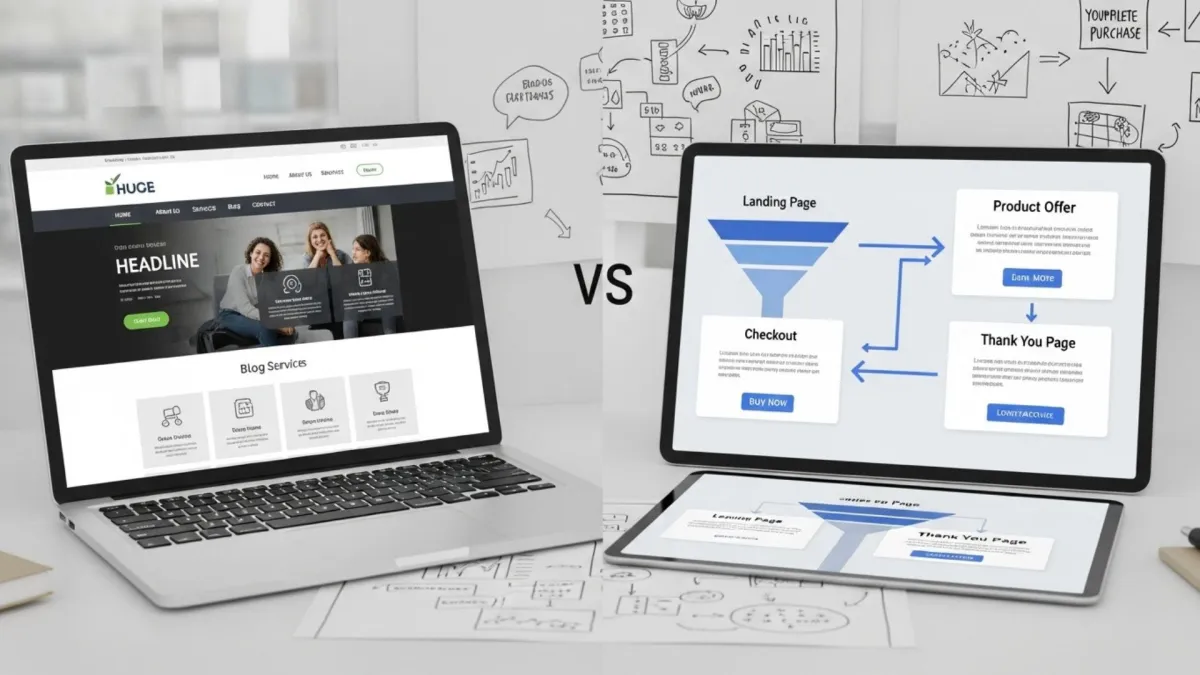
Sales Funnel vs Website: Key Differences & Use Cases
In the world of digital marketing and online business, “sales funnels” and “websites” are often used interchangeably—but they serve very different purposes. As more entrepreneurs, startups, and small businesses go digital in 2025, understanding the difference between a sales funnel and a traditional website is essential for growth, conversion, and revenue.

Here in this blog, we're going to explain the major differences between a website and a sales funnel, compare their advantages, and guide you on when to use each—based on your business objective.
What Is a Website?
A website is a group of web pages that may have a homepage, about us page, product or service pages, blog, contact forms, and others. It is meant to present your brand, offerings, and values to the visitors in full.
Key Characteristics of a Website:
Multiple navigation points
Informational and branding-centric
Optimized for discovery and browsing
Designed for long-term presence and search engine optimization
Contains blog content, company history, FAQ, testimonials, etc.
Typical Website Forms:
Corporate sites
E-commerce websites
Portfolio sites
Blogs
Educational/informational sites
Purpose of a Website:
The primary purpose of a website is to educate and inform. It provides visitors with the freedom to browse at their own speed, move to various parts of the site, and gain a full understanding of what your business has to offer.
What Is a Sales Funnel?
A sales funnel is a sequential process that is intended to lead a visitor into taking a particular action—most often a purchase, sign-up, or reservation. As opposed to websites, funnels are linear with full concentration on conversion and less distraction.
Key Features of a Sales Funnel:
A single path for the user to follow
Single-minded on one objective (e.g., lead collection, sale, webinar enrollment)
Contains pages such as opt-in, sales page, checkout, and thank you page
Tends to include limited-time offers, downsells, and upsells
Utilizes persuasion, storytelling, and urgency to turn around
Most Popular Sales Funnel Types:
Lead magnet funnel (free guide or ebook in exchange for email)
Product launch funnel
Webinar funnel
Tripwire funnel (cheaper offer to qualify leads)
Application funnel (utilized by coaches, consultants, and agencies)
Function of a Sales Funnel:
A funnel is constructed to convert—and quickly. It eliminates distractions, reduces options, and utilizes compelling copy, deals, and urgency to encourage the user to perform one particular task.
When Should You Use a Website?
Use a website when you want to:
Establish long-term trust and credibility
Build your brand's web presence
Offer extensive information on your services
Rank on Google for SEO keywords
Enable multi-product navigation (e.g., e-commerce)
Publish blogs, updates, and educational content
Provide freedom for visitors to roam
Example:
A real estate agency such as Brighton to Burj must have a corporate website that features listings, company history, testimonials, a blog of Dubai property trends, and contact forms. This establishes trust, informs prospective buyers, and aids organic search traffic.
When Should You Use a Sales Funnel?
Use a sales funnel when your objective is to:
Sell a product or service directly
Capture leads for follow-up
Promote a limited-time offer or campaign
Host a webinar or online event
Upsell or cross-sell using email automation
Run targeted ad campaigns
Example:
If you're providing a free downloadable e-book on investing in Dubai real estate, you can utilize a lead generation funnel. The funnel will consist of an opt-in page (for email collection), a thank you page, and possibly a follow-up offer for a consultation or property visit.
Why Funnels Convert Better Than Websites (In Some Cases)
Websites are perfect for discovery and information, but they are not designed to close quickly. On the other hand, a funnel offers a psychological path through elements such as:
Urgency ("Offer is valid for 24 hours")
Scarcity ("5 places remaining for the webinar")
Social proof (testimonials, case studies)
Authority (expert advice, videos)
Simplicity (no menu, no distractions)
These elements compel users to act—making funnels incredibly powerful for paid ads, product launches, and cold traffic campaigns.
Can You Have a Website and a Funnel?
Yes—and you should.
Utilize your website as your central hub: establish brand awareness, rank for keywords, provide general content.
Utilize funnels as your engine for marketing: create product launches, capture leads, and nurture prospects.
By doing both, you establish a digital ecosystem that fosters long-term growth and short-term conversion.
Platforms That Assist You in Building Both
In 2025, most tools enable you to create both websites and funnels without any coding. One such top-notch option is VizionCX—a one-stop-shop that provides:
Drag-and-drop website creator
Funnel builder features
Email marketing and automation features
Integrated CRM
SEO optimization
Affordable prices
If you are a startup, solopreneur, or small business interested in maximizing ROI while minimizing tech woes, VizionCX is one of the top platforms to begin with.
Final Verdict: Website or Funnel?
In summary, use a website to build trust, inform, and support your brand. Use a sales funnel to drive specific actions and grow revenue quickly. Each serves a unique purpose—and together, they form the foundation of a powerful digital strategy.
Ready to Build Your Funnel or Website?
Whether you're new to the game or looking to optimize your digital plan, look to VizionCX—the cheapest all-in-one website and funnel builder of 2025.
Contact us now and book a consultation call to get started.


Facebook
Instagram